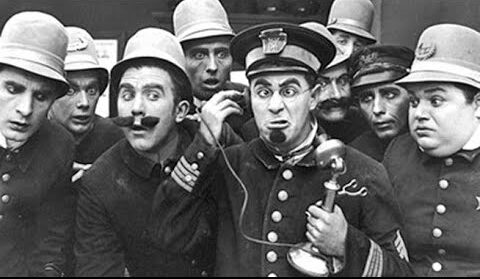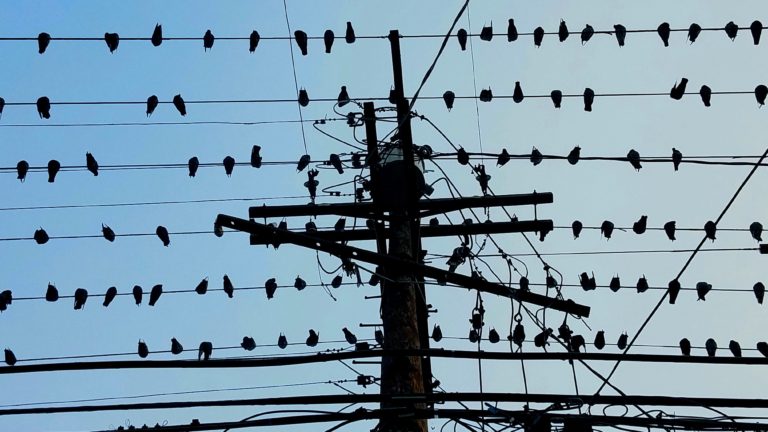Charles Albert – Fiction
The Cop-Watch Advocates demanded to know Zapata’s name, and filmed the suspect and his pool of blood with great enthusiasm....

Officer and Cadet
It was a Sunday in the early two-thousands, after the Fiesta de Sant Nicolas crush to the seashore. All week long, officers of the regional police force of Catalonia, the Mossos d’Esquadra, had been working with the Tarragona police department to keep the order and protect the all-important tourism trade. Finally, on the last day of the fiesta—a quiet Sunday—Sergeant Ignasi Brequeño, a lean and grizzled senior officer, and his trainee, Cadet Ricard Zapata, a beefy young ex-rugby player, were the only two on duty on the Rambla Nova in the Old Town.
Brequeño was trying to rack up enough overtime to be able to afford a little chalet in the hills, which is why he’d opted to work the holiday. Zapata was still a novell, without enough seniority to escape the day’s duties.
Brequeño and Zapata started their shift with a call about an assault on the Rambla. The suspect was a local whom the police had been dealing with throughout the whole fiesta, a known drogoadicte, usually on coke. When the officers got there, the drogo was staggering around on the sidewalk, confronting passersby with slurred curses. Brequeño approached him from one side, Zapata the other. They grabbed the drogo’s arms. But as the officers stood him up to handcuff him, he lurched forward and started twisting to escape their grip. Zapata tried an arm bar takedown: pulling on the detainee’s wrist with one hand, and the other hand on the back of his upper arm. But this was the first time Cadet Zapata used this move on a detainee, and he applied too much force. The suspect fell forward, with Sergeant Brequeño flipping comically over on the sidewalk. The drogo got a big, bloody gash on his forehead from hitting the sidewalk face-first, and started shouting for help.
A Cop-Watch Advocate happened to be nearby, talking to someone on his cellphone. He stopped and said, “Hold on, I’m witnessing police brutality right now.”
At that time, Tarragona Cop-Watch Advocates were a loose-knit group of citizens who believed the Mossos d’Esquadra officers used excessive force and needed to be monitored. In the days before cell phones had cameras, they carried camcorders to record police actions. This young man folded up his phone and turned on his camcorder.
The officers did understand that the Cop-Watch Advocates worked for a laudable ideal. Certainly, they understood that civilians should always carry an active and intelligent concern for how their laws are enforced. But even Zapata, so early in his career, had already decided that most of the advocates responded more readily with outrage than intelligence. So while they cuffed the suspect and Brequeño was seating him in the back seat of the patrol car, the cadet turned to the young man.
“Brutality? What are we doing that’s brutal?”
The student lowered his camera and stammered, “Well… well, look how you brutalized him!”
“Tell me, sir,” Sergeant Brequeño called out from the police car. “Do you know what violence this guy was responsible for, before we got to him? Do you know anything about his victims? The ones who called us, or why?”
“No, I guess not.”
“Do you think this guy would have hesitated to harm you, if he’d had the opportunity?”
The student turned off his camcorder and scurried away.
As the officers got into the front seats of the patrol car, a young North African man approached them, needing directions to the city hall. Part of the police mandate was to interact pleasantly with the members of the community, and they took this mandate seriously. Zapata had begun to know many regulars in the neighborhood, and was on a friendly basis with shopkeepers, residents, and students. He leaned an elbow out the open passenger window and answered the young man’s question, following up with, “Have you been in Tarragona long? What do you think of the city?”
“I’ve been here for six months. I’m in the archeology department at the university,” the young man said with a smile. “And the variety of architectural ruins here is quite surprising. I’d heard about all the Roman fortifications, of course, but I am delighted by the fine examples of Cyclopean walls that still exist here.”
“Yes, there’s evidence of human cities here for centuries before the Romans,” Brequeño said from the driver’s seat.
A passing middle-aged woman in flowing robes and a necklace of large crystals stopped.
“Hey, young man! Are those officers harassing you?”
“We’re harassing no one, madam,” Zapata responded pleasantly. “We’re having a nice talk.”
“I wasn’t talking to you,” she snapped,
“He’s quite right, my dear lady,” the student said to her, nodding. “I am the one who approached him for directions, and he kindly answered.”
She shook her head in frustration and walked away.
II.
After checking their suspect in at the station, the officers were dispatched again: a second drogo. According to radio updates, this one was terrorizing shopkeepers by grabbing things from clothes racks, shoving away employees who confronted him, and threatening to beat up anyone who got in his way.
They arrived back on the Rambla Nova in front of the store, but didn’t see the suspect. Brequeño parked the car and went into the store for a report and a description. Meanwhile, Zapata walked along the street through the thin crowd of beachgoers. The woman with the flowing robes slowly passed him by again, giving him another dirty look.
A commotion several shops up ahead caught Zapata’s attention: the suspect fighting his way out of another store. The fellow was big—a hundred and ninety centimeters and almost a hundred kilos. Two clerks were running after him, and he was carrying a whole rack of their shirts, the arms flapping in the breeze as he ran. His sergeant was still inside the boutique, so Zapata ran to arrest the drogo by himself.
One of the clerks had been knocked to the ground, and the other was helping him to get back up. The trouble-maker was now trotting down the sidewalk, the rack of shirts still under his arm. Zapata ran after the suspect, but he made a sudden turn to dash across the street. Zapata managed to grab him by the arm.
“Come on over here to the sidewalk,” the cadet growled.
They were in the middle of the crosswalk. The drogo dropped his booty and turned towards the officer.
It looked like the man was going to start swinging, so Zapata yanked on his arm for another arm-bar takedown. The suspect was caught off balance, and he went head first hard into the sidewalk. His forehead split open and he went out cold. A pool of blood began to spread.
Nearby people crowded around immediately, convinced that they had just witnessed the man’s death. A Cop-Watch Advocate in the crowd flipped on his camcorder, crying out, “I can’t believe it! That officer just killed this poor man! For no reason!”
Sergeant Brequeño arrived, rolled the drogo over and applied a bandage to his forehead. He got him into handcuffs while they waited for a medical team to check him for a concussion. Meanwhile, the flowing-robe woman had joined the crowd.
“Is that—blood?” She turned to the crowd. “I’ve been walking up and down this street, and everywhere I look, I see more Mossos d’Esquadra. Is this some sort of police state?!”
“Uh, lady,” Zapata said, “you’ve seen me and my partner three times. We’re the only Mossos working the Rambla.”
The Cop-Watch Advocates demanded to know Zapata’s name, and filmed the suspect and his pool of blood with great enthusiasm. The suspect, though, was cleared by a medical team. Meanwhile, several of his victims began loudly telling their stories to the sergeant, which made for much less compelling cinematography. After taking statements, the cops transported the suspect to jail. The advocates, still convinced that innocent blood was on police hands, nonetheless posted a scathing report on their blog.
III.
Brequeño and Zapata took a much-needed lunch break in the park surrounding the north part of Tarragona. The rugged terrain was covered in tall trees, so it was also home to hundreds of solitary homeless people who camp out up there to avoid the city crowds. On this day, the Mossos d’Esquadra dispatch got word that there was a dead body in a tent, and the informant gave a vague description of where it was. So after they finished eating their bocadillos in their car, Brequeño and Zapata were ordered to search for the body. They followed the directions up a steep hill, and thanks to its horrific stench, found the tent tucked behind trees.
“Cadet Zapata, go have a look inside the tent,” Sergeant Brequeño commanded.
Zapata took a deep breath and poked his head inside. He leaned out a moment later. “Yes, sir. The guy inside is very dead. His skin is blue.”
“Blue?”
“Yes, sir. A bluish greenish color, like the Incredible Hulk.”
Brequeño called in the find.
“Understood, Sergeant Brequeño. I’m sending the coroner up now. But we’re going to need you to look around for any evidence of identity.”
Brequeño turned to Zapata.
“Cadet Zapata, I need you to go back in the tent and find his ID.”
Zapata took a deep breath, ran in, unsuccessfully digging around the filthy piles of clothes for a wallet, and running back out each time he needed to take another breath. Meanwhile, Brequeño, who was something of an outdoorsman, showed the cadet a trick: he picked several leaves from a nearby bay tree.
“It’s how hunters mask odors while field-dressing prey,” he said. “Roll them up, and stuff them in each nostril.”
Once outfitted, the cadet took three deep breaths, then ran back in. But he wasn’t making much progress, and eventually he gave up and just breathed inside the tent as he hunted for the corpse’s wallet. The stench of rotted human flesh was more nauseating than anything the young man had ever smelled in his life.
At last, the ID card was recovered. The two cops had to wait for the coroner’s office to collect the body, so they found a log to sit on well away from the tent, with bay leaves up their noses.
IV.
Back on the Rambla Nova, Zapata and Brequeño were immediately dispatched to a report of a shoplifter at a beach clothing store who had assaulted a clerk. They got out of their car and walked up and down the adjacent streets in search of the suspect. Brequeño radioed Zapata to say he had a suspect on foot that he was following. The cadet came out a side street to find Brequeño chasing someone straight towards him. Zapata tried to tackle the suspect, but the suspect dodged him.
Now Zapata had to join the chase. Brequeño was right behind them, but their police gear was heavy, and not good for running fast for any distance. They weren’t able to catch up.
Another Mossos d’Esquadra sergeant, riding on a motorcycle nearby, had been listening on his radio and headed their way. He came out of an alley perpendicular to the Rambla and collided with the suspect, who fell over the front wheel. As he got back on his feet, Zapata lowered his shoulder into the fugitive’s back for a flying tackle. The suspect went down flat on his face with the full weight of the husky cadet in his police gear on top of him.
The suspect had a bag with him that contained thousands of euros worth of jewelry stolen from two neighborhood stores. One of the store owners, herself a poor immigrant, burst into tears when their property was returned, and told reporters and frustrated Cop-Watch Advocates that her family had just been saved from financial ruin.
V.
That evening, the officers responded to call about a wiry unkempt man who had ordered a sandwich from a tapas joint and left without paying for it. When the waiters tried to stop him, he was aggressive and confrontational, with jerky motions and incoherent babble, so he was reported to be on meth.
The officers got him handcuffed on the street corner across from the restaurant, but then Zapata had to wait for Brequeño to get the car. While waiting, the suspect grew more agitated. He started yelling obscenities at Zapata, and that drew a crowd. Among the onlookers was the lady with the large crystals. She had a camcorder now, and she began filming as the handcuffed suspect tried to get away. Zapata grabbed his arm and told him to hold still. He kept yelling and trying to get away, so the cadet pulled the drogo to the ground. But even lying handcuffed on the sidewalk, he kept trying to escape. “Llepa’m les pilotes,” he shouted over and over; “Lick my balls.”
Zapata had to subdue him, so he rolled the suspect onto his side. Then he knelt with his knee onto the side of the man’s head to prevent him from getting up until Brequeño arrived. The Cop Watch group proudly put the video on their website. Yet the woman who had recorded the entire encounter—from the guy yelling threats and curses, to him trying to walk away three times, to Zapata pulling him to the ground and rolling him over—edited it to only show Zapata kneeling on the handcuffed man’s head. She narrated the scene to say that it was brutal to watch the police unjustifiably manhandle a person already handcuffed.
VI.
As the evening shift was drawing to a close, Brequeño and Zapata were sent to investigate a complaint of two transients fighting next to a farmacia. When they arrived, they separated to comb the area on foot. Brequeño found a man in the park next to the farmacia, and learned that the man was the one’d asked the farmacia employees to call the police: he’d been kicked multiple times while he was asleep on a park bench. As he was talking to the officer, he suddenly pointed toward Zapata in a distant parking lot, and said, “There he is, sneaking up on your partner!”
Brequeño radioed Zapata, who turned around and recognized Ernesto, a mentally disturbed young man who had been arrested for a violent attack recently and was supposed to be in a mental hospital.
Ernesto was almost upon Zapata. He had a blank “thousand yard stare” in his eyes, and he began repeating “I am Satan.”
“Ernesto!” Zapata yelled. “Stop! Get on the ground.”
Ernesto kind of did a double take, as though Zapata had just woken him up, and he complied and laid down on his stomach on the ground.
Zapata thought he had the advantage and started talking on the radio to update the situation. The blank stare came back over Ernesto’s face as he pushed himself back up off the ground. Zapata ordered him to lie down again, but Ermesto got up and came at the cadet with outstretched arms like a zombie. Zapata backed off to keep some space while he tried to figure out what to do next.
The Mossos had been experimenting with Tasers. But Zapata didn’t trust them and didn’t carry one. He’d also left his baton in the patrol car. He did have pepper spray, but he didn’t like using it because it was just as likely to get in his eyes as it was on the person he sprayed. So Zapata knew that he was going to have to either shoot the boy, or take him down with his own hands.
Zapata punched Ernesto in the face with the heel of his hand. His head snapped back, but instead of falling down, a look of fury came over Ernesto. He swung a punch at Zapata which glanced off his forehead. They got into a grappling stance, with each holding onto the other’s shoulders. Zapata had been strong and heavy enough to toss most perps to the ground when he got in this situation, but Ernesto was also stout. In addition, he was sweaty, and the cadet couldn’t get a good enough grip or leverage on him to drop him. He tried kicking at Ernesto’s groin, but the kid dodged it. Still, the momentum from the kick allowed Zapata to step up next to Ernesto and put him in a headlock. He hoped he could just hold the boy until Brequeño could arrive. Then he realized the headlock had put Ernesto down around Zapata’s waist with access to his pistol, because the boy was trying to yank it out.
Ernesto didn’t know how to release the safety strap—he was just trying to yank the pistol straight out. Zapata clamped his hand over Ernesto’s hand. This released Ernesto’s head from the headlock, and he was still yanking the holstered gun.
They were backed up against a row of cars in the parking lot, and this limited Zapata’s freedom of movement. So he just hung on, waiting for Brequeño. He had a back-up handgun in a holster inside his shirt underneath his left arm, and he thought about trying to get it out. But Ernesto’s left arm was covering up the access to that gun, and Zapata couldn’t get to it with just one free hand. But he didn’t want to release the grip on Ernesto’s hand with his other hand.
Ernesto was growing more desperate; Zapata had to do something. He pulled out the pepper spray and sprayed the kid in the face. Then he broke free, turned around, and faced the kid. Tears streaming down his own face, Zapata shoved the kid up against the nearest car and pinned him there.
Brequeño was almost there as Ernesto wriggled out of Zapata’s grip and bolted. In a few seconds, he was on a bicycle heading back for the Rambla Nova, his torn shirt flapping wildly as he rode.
VII.
The sergeant and cadet jumped back in the patrol car and circled around a few blocks to approach the Rambla Nova from the other direction. They picked out Ernesto, on his bike with a group of other drogos. He was looking the opposite direction.
Brequeño dropped off Zapata and drove down an alley; his plan was to get on the other side of Ernesto. The cadet played it cool, casually strolling in Ernesto’s direction. He even turned his head a little away, so if the group saw him, they wouldn’t think he was looking for Ernesto.
The patrol car reappeared a minute later, coming down the Rambla Nova from the direction Ernesto had been watching. The boy put his foot on a pedal and turned around, running right into Zapata, who grabbed the kid by the shirt before he could build up speed.
Ernesto ripped out of his shirt, tumbled off his bike, now running back toward Brequeño. In his panic, he ran right into a group of people exiting The Wormwood, a popular vermouth bar on the Ramblas. One unsuspecting lady stepping from the bar onto the sidewalk became the obstacle that Ernesto bowled over.
The kid ducked into a blind alley and jumped a fence surrounding the ruins of a Roman forum. Brequeño and Zapata went around to the site’s entrance. They crept slowly through the piles of stonework and found Ernesto hunched down behind a mound in the middle of the forum.
“Ernesto! Sit on the ground,” Zapata barked.
Instead, Ernesto lurched forward. Zapata threw the kid onto the ground. The kid rose off the ground even with the cadet trying to hold him down. The cadet jumped on his back. The kid’s arms buckled, and he flattened out on the stones. He still pushed both himself and the hundred and twenty kilos of outfitted Zapata up off the ground again. So the cadet gave a quick strike with the palm of his hand to the back of the kid’s head, and his face went straight into the ground. This stopped the struggle. Zapata lay on top of him, pinning his arms on the ground as Brequeño approached. The officer raised his baton and brought it down with an impressive whack on the boy’s calves. Ernesto cried out in pain, and thrashed about desperately to try to free himself.
“What are you doing?” Zapata hollered. “I’ve got him. You just need to cuff him.”
“Gonna teach him a good lesson,” Brequeño grunted, raising the baton again. “He tried to shoot you back in that parking lot. I saw the whole thing. And there’s no fucking cop watchers down here.”
“Just put the cuffs on him,” Zapata pleaded. “I can’t hold him much longer.”
VIII.
Brequeño lowered his baton, but he didn’t produce any handcuffs. Instead, he squatted so he could look eye to eye to Zapata, and the young drogo.
“Let me tell you something,” he said. “Did you hear about the high-speed collision last night?”
Zapata tightened his grip on Ernesto, who stopped struggling. The cadet realized he could not utter the retort that was burning in him at that moment, not to his sergeant. Not in front of Ernesto.
“Did you hear who the victims were? A family. Coming home from the concert on the beach. Papa and Mama in the front seats, and their two daughters—young. Twelve or thirteen! In the back. They come to a stop sign, and as they start to go through, a woman driving eighty kilometers per hour comes out of nowhere, broadsides them. That collision snapped the two girls’ necks, killing them both instantly.
“The woman driver? She jumps out of her car and runs into a nearby house. When we find her, she’s washing her nose and mouth with soap. Trying to hide the coke. Cared more about her fucking ass than the family she’d smashed into.”
Zapata was a father of young children himself. He shuddered.
“Those parents had been doing everything right: a nice, wholesome family outing, driving in a safe car on a quiet street, both kids in the safest part of the car. And then in the blink of an eye, their two children were taken from them, forever. All because of some cunya who had to get her fucking coke fix. Spain is falling apart, thanks to these drug fiends.” He raised the baton above Ernesto’s head.
“I—I hear you,” Zapata closed his eyes and braced himself for the sergeant to begin beating Ernesto anew.
The click of the handcuffs on Ernesto’s wrists came as a surprise to Zapata. A miracle.
“Oh, hell. You’re right. That’s not our way,” Brequeño said.
Zapata got up and helped his commander lead Ernesto back out of the theater and into the squad car. The young cadet knew better than to say anything, and Brequeño made no further noise other than a world-weary sigh.
They radioed in their arrest and drove an excitable Ernesto to jail. The boy was chattering and singing in the back seat. Ernesto could hear on the police radio that Zapata was referred to as “124,” which was his badge number and radio call sign. So as they were pulling up to the jail, Ernesto started chanting, “124 fucking rocks! 124 fucking rocks!”
He repeated rhythmically, so when Zapata had to announce over the radio that they were at the jail gate, he waited for a pause in Ernesto’s chant and cued that he had an update.
The dispatcher said, “124, go ahead,”
Zapata keyed the mic as Ernesto bellowed another stanza of his chant, and so it was clear to everyone listening that Number 124 did, indeed, fucking rock.
***
You can learn more about Charles Albert by clicking on his bio: https://thievingmagpie.org/charles-albert-bio/



